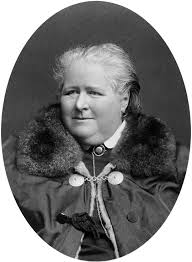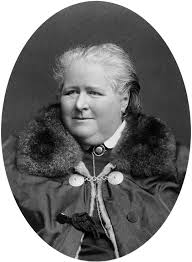She was the author of a number of books and essays, including The Intuitive Theory of Morals (1855), On the Pursuits of Women (1863), Cities of the Past (1864), Criminals, Idiots, Women and Minors (1869), Darwinism in Morals (1871), and Scientific Spirit of the Age (1888).
Cobbe was a member of the prominent Cobbe family, descended from Archbishop Charles Cobbe, Primate of Ireland. She was born in Newbridge House in the family estate in what is now Donabate, Co. Dublin.
She formed a marriage with sculptor Mary Lloyd (b. 1819), whom she met in Rome in 1861 and lived with from 1864 until Lloyd's death. In letters and published writing, Cobbe referred to Lloyd alternately as "husband," wife," and "dear friend." Cobbe founded the Society for the Protection of Animals Liable to Vivisection (SPALV) in 1875, the world's first organisation campaigning against animal experiments, and in 1898 the BUAV, two groups that remain active. Cobbe was a member of the executive council of the London National Society for Women's Suffrage and writer of editorial columns for London newspapers on suffrage, property rights for women, and opposition to vivisection.
Cobbe met the Darwin family during 1868. Emma Darwin liked her, "Miss Cobbe was very agreeable." Cobbe persuaded Charles Darwin to read Immanuel Kant's Metaphysics of Ethics. She met him again during 1869 in Wales, and apparently interrupted him when he was quite ill, and tried to persuade him to read John Stuart Mill—and indeed Darwin had read Cobbe's review of Mill's book, The Subjection of Women. She then lost his trust when without permission she edited and published a letter he'd written to her. Her critique of Darwin's Descent of Man, Darwinism in Morals was published in The Theological Review in April 1871.
Her name is listed on the south face of the Reformers Memorial in Kensal Green Cemetery in London.
She was the author of a number of books and essays, including The Intuitive Theory of Morals (1855), On the Pursuits of Women (1863), Cities of the Past (1864), Criminals, Idiots, Women and Minors (1869), Darwinism in Morals (1871), and Scientific Spirit of the Age (1888).
Cobbe was a member of the prominent Cobbe family, descended from Archbishop Charles Cobbe, Primate of Ireland. She was born in Newbridge House in the family estate in what is now Donabate, Co. Dublin.
She formed a marriage with sculptor Mary Lloyd (b. 1819), whom she met in Rome in 1861 and lived with from 1864 until Lloyd's death. In letters and published writing, Cobbe referred to Lloyd alternately as "husband," wife," and "dear friend." Cobbe founded the Society for the Protection of Animals Liable to Vivisection (SPALV) in 1875, the world's first organisation campaigning against animal experiments, and in 1898 the BUAV, two groups that remain active. Cobbe was a member of the executive council of the London National Society for Women's Suffrage and writer of editorial columns for London newspapers on suffrage, property rights for women, and opposition to vivisection.
Cobbe met the Darwin family during 1868. Emma Darwin liked her, "Miss Cobbe was very agreeable." Cobbe persuaded Charles Darwin to read Immanuel Kant's Metaphysics of Ethics. She met him again during 1869 in Wales, and apparently interrupted him when he was quite ill, and tried to persuade him to read John Stuart Mill—and indeed Darwin had read Cobbe's review of Mill's book, The Subjection of Women. She then lost his trust when without permission she edited and published a letter he'd written to her. Her critique of Darwin's Descent of Man, Darwinism in Morals was published in The Theological Review in April 1871.
Her name is listed on the south face of the Reformers Memorial in Kensal Green Cemetery in London.
Family Members
Sponsored by Ancestry
Advertisement
Explore more
Sponsored by Ancestry
Advertisement



